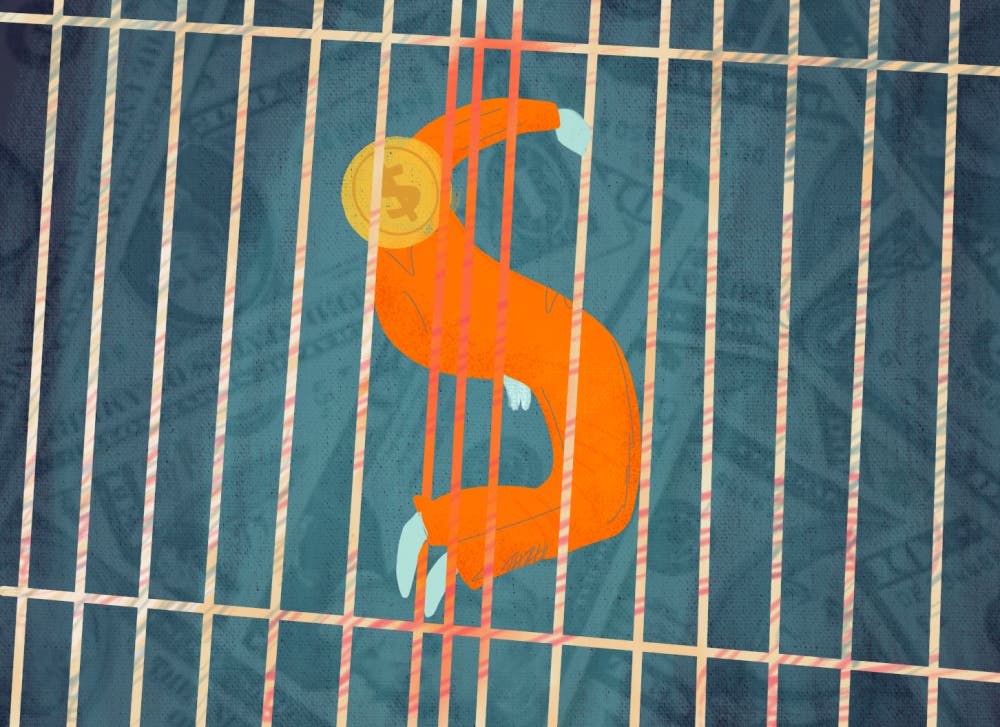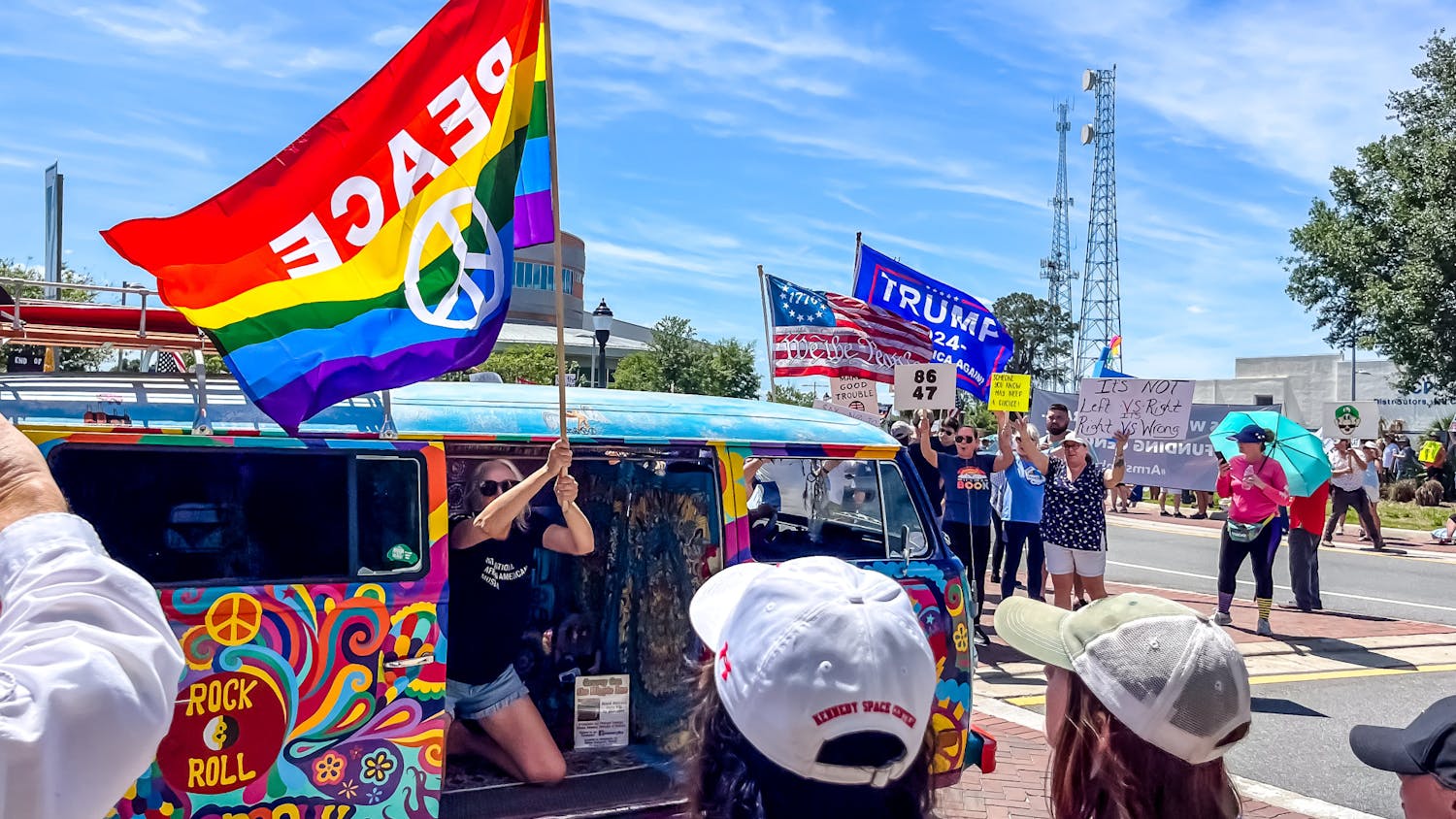
The fund was created to protect people in jail from COVID-19 who can’t pay their bond
Richard Morris’ words have always gotten him into trouble. So, on Friday, protesters lent him their own.
Though he couldn’t hear them through the thick, concrete walls of the Alachua County Jail, around 150 people gathered outside at 6 p.m. to protest mass incarceration and police brutality as part of an observance of Juneteenth. He would be released later that night.
The timing was important—organizers warned that the jail would go on lockdown in response to the rally, but they wanted inmates who were outside for recreation time to hear them. Once protesters arrived, horns went off in the building.
They met at the Martin Luther King Jr. Multipurpose Center, at 1028 NE 14th St., where multiple speakers took to the microphone to share stories about their loved ones in prison or to talk about issues in the U.S. criminal justice system. Then, protesters formed a motorcade to travel six minutes away to the jail.
“This is the physical embodiment of all those injustices,” said Maria Dozier, a 20-year-old UF sustainability in the built environment senior who was there protesting. “This is a big, concrete building holding people inside that are supposed to be getting reformed, but instead they’re suffering from police brutality and other injustices every day.”
During the protest, people incarcerated in Florida prisons called in and were able to speak to the crowd through a speakerphone.
One man who has been incarcerated for 15 years talked about the things he’s learned about slavery and Black history from reading while in prison that he was never taught in school.
“When they take that from us, when our so-called educational system deprives us of knowing this truth, we are deprived of knowing our true self,” he said. “I can’t love me if I don’t know me.”
Danielle Chanzes, who organizes with the Legal Empowerment and Advocacy Hub and Florida Prisoner Solidarity, read aloud the names of every person inside the Alachua County Jail with help from other protest organizers. It took more than 45 minutes to get through the list.
Thunder cracked and rain poured down onto a sea of umbrellas as the crowd listened. Chanzes would stop briefly on the names she knew and explain a little about them, eventually getting to Ernest Walker, her boyfriend.
Walker is being held because he violated his probation and is denied bail because of it, so he must remain in jail until his court date, Chanzas said. In the meantime, he helps connect people in jail to the Alachua County Bond Fund.
The fund was formed in March to protect people in jail from COVID-19 according to Manu Osorio, a lead organizer with the Gainesville chapter of Dream Defenders. There was concern about the disease spreading easily in crowded conditions.
Its purpose is to pay the bonds of people in jail who can’t afford to pay it themselves. Four local organizations help manage the fund: The GoDDsville Dream Defenders, the Legal Empowerment and Advocacy Hub, the Alachua County Labor Coalition and Florida Prisoner Solidarity.
The fund is supported by community donations. So far, it has freed 20 people, Chanzes said.
The fund has seen an increase in donations lately as a result of recent Black Lives Matter protests, Osorio said.
When a person is arrested and brought to the local jail, they are typically given a bail amount, which is an amount they can pay in order to be released from jail while they wait for a trial or for other court proceedings. If they show up to all their court dates, the bail amount is refunded.
If someone can’t make bail, they have the option to pay 10 percent of the bail amount, which is called a bond, to a bail bondsman, who keeps this amount as profit. The bondsman then pays the full bail amount to the court so the person who was in jail can be released. The bondsman is refunded the bail amount if the defendant attends all court appointments.
Those who are denied bail or who don’t have enough money to pay their bail or bond will remain in the custody of the jail at least until their arraignment, which is when the prosecutor announces if charges will be filed against the defendant.

More than 60 percent of people who are unable to make bail are part of the poorest third of the U.S., according to FreeTheBlock, an organization invested in ending pre-trial detention. As a result, 74 percent of people held in jails in the United States have not yet been convicted of a crime.
Walker calls Chanzes for 15 minutes every day, often with information about people he’s met who need their help. Chanzes then contacts their friends and family members to learn more, she said.
If all goes well, they use the money raised by the bond fund to get them out of jail. Chanzes said that Walker has helped seven people get released so far, the majority of whom are Black.
Walker doesn’t feel any bitterness about seeing people released when he can’t be released himself, Chanzes said. It actually brings him a lot of joy.
“He’s become his own little freedom fighter in there,” Chanzes said.
Going through this together hasn’t been easy, she said. Last week, she said she was so overwhelmed from organizing that she burst into tears at the sound of his voice when he called her. Despite the challenges, they love each other, and they’re working on getting him released.
“In spite of the mistakes that Ernest has made, he still is of value to this community,” she said, “And ultimately the community wants him to be part of the community.”
The Alachua County Bond Fund is what enabled Morris to be released after it paid his $7,500 bond. He heard about the fund from a friend, who he said heard about it from Walker. After two weeks inside the jail with no court date scheduled, he was released.
The first thing he did was go home and eat, he said. Neck bones with barbecue sauce, prepared by his best friend’s girlfriend. The second thing he did was see his kids, who excitedly babbled to him.
“Dadadadada.”
Morris said he wants to be there for his kids. He wants to be a good father. But he now feels like he has to change things about himself to avoid being profiled.
“I got two golds in my mouth because it’s a family tradition, I got dreadlocks. I’m going to get profiled,” he said. “I need to cut my hair so I don’t fall in a certain category. These things on top of my head is making me feel like I’m being judged already.”
Contact Kaelyn at kcassidy@alligator.org. Follow her on Twitter @Kaelyn_Cassidy.





